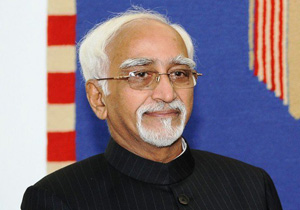New Delhi, Sept 15: In a critique of Vice President Hamid Ansari's recent speech on the need for "affirmative action" for Muslim empowerment, an article in RSS mouthpiece 'Panchjanya' has accused him of speaking like a "communal Muslim leader".
It said instead of projecting Muslims as victims of discrimination, Ansari should "tell them the truth about how Muslim radicalism is preventing them from integrating with the society".
The article attacks Vice President's take that Muslims in India face the challenges of identity, security, education and empowerment.
"There was much dejection in the much-talked speech by Hamid Ansari at All-India Muslim Majlis-e-Mushawarat, as it comes across as one made by a communal Muslim leader. The Vice President is expected not to talk preferentially of one community but to speak of benefits for all. But these elements are missing from his speech," the article says.
The piece goes on to cite radical Muslim outfits like ISIS, Taliban and Boko Haram to say Islam and modernity are "poles apart".
"Islam and modernity are like two poles that can never meet but leaders like Ansari will never tell Muslims that," it says.
It says that the VP's speech "doesn't reflect any sense of self introspection" and added only he can explain "how a religion keen on implementing 1400 year old rules can be described as modern".
On the issue if identity, it said,"Secular India has paid a heavy price to maintain Muslim religious identity... Uniform Civil Code was not implemented... Muslim Personal Law has distorted India's secular character but no Muslim leader speaks of these facilities which they treat as a right."
It also says the Constitution doesn't provide for religion based quotas.It also sited the constitutional right for minorities to set up and manage their educational institutions and questioned the continuing Haj subsidy.





Comments
Add new comment